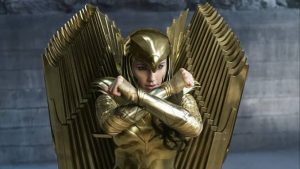SPOILERS FOR WANDAVISION AHEAD!
As WandaVision‘s central mystery expands across several decades of television history and at least two distinctly separate realities, so too does its cast of characters, both major players and bit parts. And with Wanda raising the stakes dramatically in episode three, it’s becoming more important to tell characters apart and work out the most important details in any Marvel Cinematic Universe property – who’s connected to whom, and who’s working for whom? WandaVision hints at the idea that charming newlyweds Wanda Maximoff and Vision are being manipulated by dark forces lurking within their quaint suburban community of Westview: but after yesterday it’s looking more likely that Wanda herself has a hand in causing the strange events that plague her and her husband from day one of their married life together.
Let’s get into it, shall we?
Wanda Maximoff
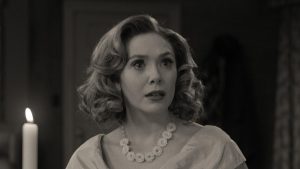
Our series’ heroine has always been something of a lone wolf. After the events of Avengers: Endgame, with Vision dead, her strongest tie to the Avengers family was severed – and it looks like she decided to finally follow Hawkeye’s lead and just retire. But Hawkeye already had a family with which to settle down. Wanda first had to build one of her own, which would require her to do…whatever she did to bring back Vision back to life, possibly only in her dreams. Noting how violent her reaction has been to the S.W.O.R.D. logo whenever it pops up in Westview, many fans have speculated that Wanda was working with S.W.O.R.D. (which stands for Sentient Weapon Observation and Response Division in the MCU) to resurrect Vision when she went rogue and decided to hijack the experiment, eloping with her android boyfriend into a pocket dimension that she created on the site of the real town of Westview…or which someone else created for her, in order to lure her into a trap. Either way, it’s beginning to look like the citizens of the real Westview are now trapped there with her against their will, and are the real victims in this messy situation.
Allegiance: let’s mark her down as a free agent for now. It may turn out she’s being too heavily manipulated to see the chaos she’s causing, but honestly, it looks like she has a lot of control over Westview and is enjoying her newfound power. So even if she’s not entirely at fault, I don’t think she’s blameless either.
Vision

How did Vision go from being killed by Wanda to being resurrected by Thanos, to being killed by Thanos, to being resurrected yet again in WandaVision? Well, extrapolating off the theory that Wanda was working with S.W.O.R.D. to resurrect the android post-Endgame, my guess is that S.W.O.R.D.’s tech was capable of rebooting Vision – but without any of his past memories, including those he shared with Wanda. Learning this could easily have spurred Wanda to betray S.W.O.R.D. and steal the android’s partially-rebooted body for her own purposes, and would explain why Vision’s memory seems so fragmented. He clearly remembers Wanda, or at least has been convinced to think he does, but he seems clueless about his past, and even his purpose in Westview: unlike Wanda, who enters the sitcom reality with a clear motive to settle down and fit in. But he’s also inquisitive, which will serve him well in the coming days/decades.
Allegiance: I believe he’s linked to Wanda, at least for now. He’ll probably try to exercise his free will as the couple clash in later episodes, but I have a nasty feeling Wanda will be able to tug him along whithersoever she goes. Doesn’t mean we won’t get an epic battle sequence out of it, though.
Agnes
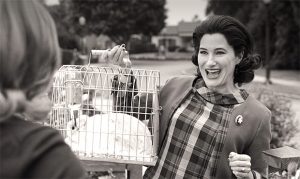
Many of us are so convinced that Wanda’s overly-friendly next-door neighbor Agnes is actually the evil witch Agatha Harkness from Marvel Comics that it’s become almost second nature to refer to her as Agatha. With literally every clue pointing towards this being the case (apart from the similar names, Agnes’ wedding anniversary is the same day the Salem Witch Trials started, she wears a witchy brooch, and even owns a rabbit named for Harkness’ son in the comics), it seems almost too easy a connection to make. Personally, I suspect Agnes will be Agatha in some form or another, and is probably still a witch, but I’m not convinced Marvel isn’t totally reinventing the character as a more sympathetic antiheroine, a victim of manipulative forces. My guess: she’s responsible for luring Wanda into the pocket dimension surrounding Westview at the orders of Mephisto, Marvel’s devil, and is thus aware of what’s going on – but isn’t fully evil.
Allegiance: Agatha Harkness being Mephisto’s right-hand woman in the comics paves the way for Agnes to fill a similar role. But her small panic attack in yesterday’s episode makes me think she’s unwillingly serving the devil and trying to escape from him. There’s an interesting story to be told there about the toxic and abusive relationships endorsed by the same patriarchal system that many classic sitcoms upheld.
Dottie And Phil Jones
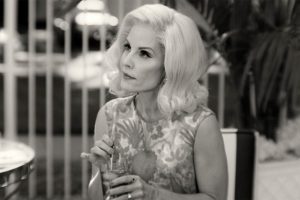
Dottie (and, to a lesser degree, her husband Phil) is perhaps WandaVision‘s biggest enigma to me at the moment, and I’ve cycled through several theories about who – or what – she is. Her high status among the citizens (particularly the women) of Westview strongly implies that, like Agnes, she may be a witch. And with witches and Mephisto going hand-in-hand in Marvel comics, it’s not too much of a stretch to extrapolate that she could be working with the devil to steal Wanda’s twins – after all, she did lead the eerie communal chant of “For The Children”. But I’m beginning to wonder if the lemonade glass exploding in her hand and revealing her red blood (in the black-and-white episode) was an attempt by Mephisto to alert Wanda to the fact that Dottie, whether she’s a witch or not, is also a third-party intruder with her own agenda in Westview.
Allegiance: if Dottie has an ulterior motive for wanting Wanda to hurry up and have kids, what is it? Like Mephisto in the comics, she could be trying to absorb young Billy and Tommy into her soul to increase her demonic power…or, if she’s not evil, she might be trying to protect the children before someone else has a chance to kidnap them.
The Townsfolk
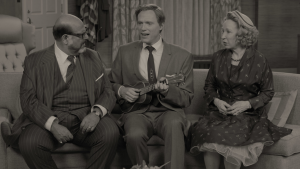
Despite how it looks, not everybody in Westview has some grandiose plan to steal Wanda’s babies – and now that episode three has confirmed that Westview is a real town in the real world, it would seem that most of the background players in WandaVision are just regular people who got sucked into the sitcom fantasy against their will. Judging by how close Westview appears to be to a large S.W.O.R.D. complex, some of these people might be low-level S.W.O.R.D. staffers, nonthreatening to Wanda. Vision’s co-worker Norm could fall into this category (his actor, Asif Ali, also played a low-level Cybertek employee in Agents Of S.H.I.E.L.D.). Others, like Herb and possibly the mailman Dennis, might have a better idea of what’s going on – Herb even begins to disclose the truth to Vision, telling him that “Geraldine” arrived in Westview “because we’re all…she came here because we’re all…” before being stopped by Agnes, who confronts him with a panic-stricken expression. We’re all…trapped, I assume? Dennis has his own bizarre run-in with Agnes while walking past Wanda’s house, where they exchange what seems like coded banter.
Allegiance: most of these folks, with the possible exception of Herb and Dennis, probably don’t have any strong allegiances that will put them at conflict with Wanda, Mephisto, or even neighbors like Agnes. If that changes, I’ll be sure to point it out.
“Geraldine”

Long before WandaVision premiered, it had already been confirmed by Marvel that Teyonah Parris would be playing Monica Rambeau in the series, so “Geraldine’s” secret identity was never much of a mystery. Set photos and promotional material had also revealed that Rambeau, last seen in the MCU as the young and impressionable daughter of retired test pilot Maria Rambeau in Captain Marvel, would now be working with S.W.O.R.D. in some capacity. If WandaVision were following the comics exactly, this would totally make sense: there, S.W.O.R.D. deals with space and explores alien worlds, and MCU Monica grew up surrounded by aliens thanks to Captain Marvel’s dealings with her mother. But MCU S.W.O.R.D. tackles “sentient weapons”, making Monica’s chosen career path a little more confusing. In the comics, Monica also has superpowers – which I think Wanda might have accidentally given to her when she wrapped Monica up in a hex-magic cocoon and tossed her out of WandaVision.
Allegiance: Monica seems loyal to S.W.O.R.D.; though a conflict could arise if S.W.O.R.D. responds to Wanda’s actions with further violence, and Monica cautions them to go gentle. Monica was raised to see the good in everybody: I think she’ll sympathize with Wanda’s pain, and genuinely want to help her.
“Ralph”
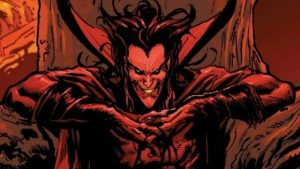
In the first three episodes of WandaVision, we’ve learned more random details about Agnes’ mysterious husband “Ralph” than we’ve learned about Agnes herself…but where is he? Who is he, really? Until he shows up in person, we won’t know – but my suspicion is that he’s none other than Mephisto himself, and that his marriage with Agnes is more metaphorical than anything (but literal enough that Agnes actively avoids her “mother-in-law”), a way of hiding in plain sight while observing Wanda. Agnes’ remarks about him paint a disturbing picture of a repulsive character whom Agnes wants to leave, but can’t.
Allegiance: if “Ralph” truly is Mephisto, he serves no one but himself, but freely manipulates those around him, like Agnes, Dottie, and of course, Wanda.
So what do you think? Which WandaVision characters do you want to know more about heading into episode four? Share your own thoughts, theories, and opinions, in the comments below!



